Dev Story: Beneath Oressa’s Porting Success With Optimization At Its Core
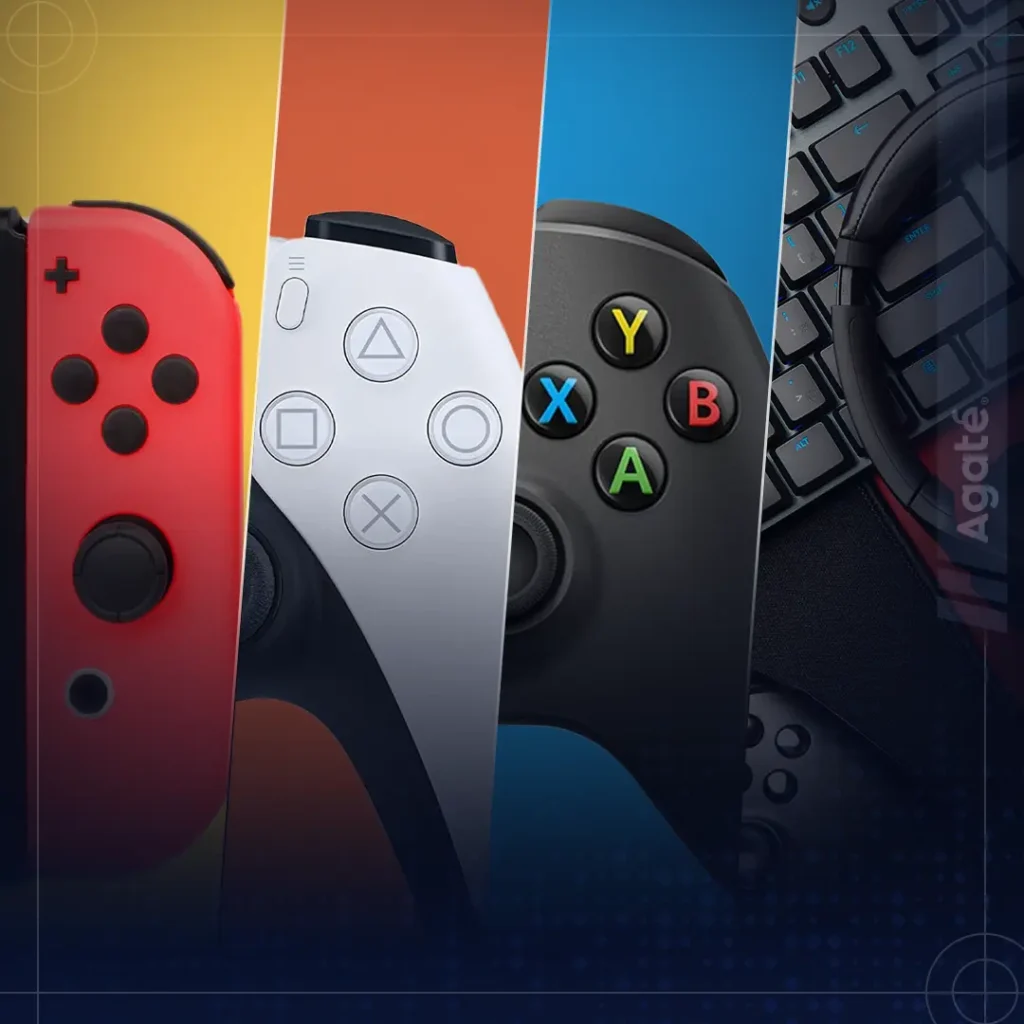
Agate embarked on an exciting project: bringing the visually striking PC game Beneath Oresa to a wider audience on PlayStation, Xbox, and Nintendo Switch. Source: Beneath Oresa Steam Page Beneath Oresa is a fun, card-based fighting game that resembles a comic book. This unique look makes Beneath Oresa stand out from other deckbuilding games. A fruitful encounter at the Game Connection Europe sparked a collaboration between Agate and Goblinz Publishing. Agate’s porting team’s in-depth initial assessment demonstrated the game’s strong technical foundation. This positive evaluation laid the foundation for strong partnership, and we were honored for Goblinz Publishing’s trust in Agate for this project. Overcoming Challenges, One Step at a Time The porting of Beneath Oresa presented several key challenges: Handling comic shader errors and incompatibility The original PC version’s shaders often caused visual glitches or failed to render properly on console hardware, requiring significant modification and optimization. Resolving crashes due to memory issues on specific platforms Consoles have limited memory compared to PCs. This challenge meant identifying and fixing instances where the game consumed too much memory, leading to crashes. This issue required careful optimization of assets and code, particularly on platforms with stricter memory constraints. Maintain Stable FPS across platforms Ensuring a smooth, consistent frame rate (FPS) is crucial for a good gaming experience. This challenge involved optimizing the game’s performance to avoid frame rate drops, which can cause stuttering or lag. This issue required platform-specific optimizations, as different consoles have varying processing power. How We Made It Happen Once we understood the full scope of the difficulties, we formulated a strategic plan to deliver the project on schedule. Set Milestones Agate’s porting strategy for Beneath Oresa involved a carefully structured four-phase approach: pre-alpha, alpha, beta, and gold. We strategically defined each milestone to guarantee a seamless transition from PC to the target console platforms. Getting Familiar with the Custom Shader A significant hurdle in the porting of Beneath Oresa was optimizing its distinctive custom-comic-style shader, crafted in HLSL. While visually striking on PC, this shader presented performance challenges on consoles, leading to crashes and frame rate drops. Overcoming this required the specialized knowledge of our technical artists, who collaborated closely with the programming team to refine the shader, ensuring smooth gameplay without compromising its unique aesthetic. Optimizing Code and Assets Following the successful modification of the custom shader, the team intensified their efforts to optimize Beneath Oresa’s code and assets. This step involved adjusting the engine version to address bugs, fine-tuning renderer settings to reduce memory footprint, and specifically for the Nintendo Switch, integrating dynamic resolution to maintain consistent frame rates in demanding areas. We delivered the Beneath Oresa porting project within three months. Compared to other projects we’ve undertaken, the project’s unique challenges provided Agate’s team with valuable experience. Each project, with its own set of obstacles, allows us to expand our skillset and refine our expertise, ultimately leading to improved outcomes in future game porting projects. Console Porting: Optimization is Key Given the growing complexity of game specifications and the constraints of console hardware, optimization is essential for smooth gameplay on any platform. This project significantly contributed to our expertise in both porting and optimization, equipping us to deliver consistent and high-quality gaming experiences across diverse console platforms. If you’re looking for a partner who brings passion, expertise, and dedication to every project, Agate is ready to help you bring your game to new heights. Reach out to contact@agate.id and let’s create exceptional games together!
Cultural Representation in Games: The Power of Inclusive Storytelling
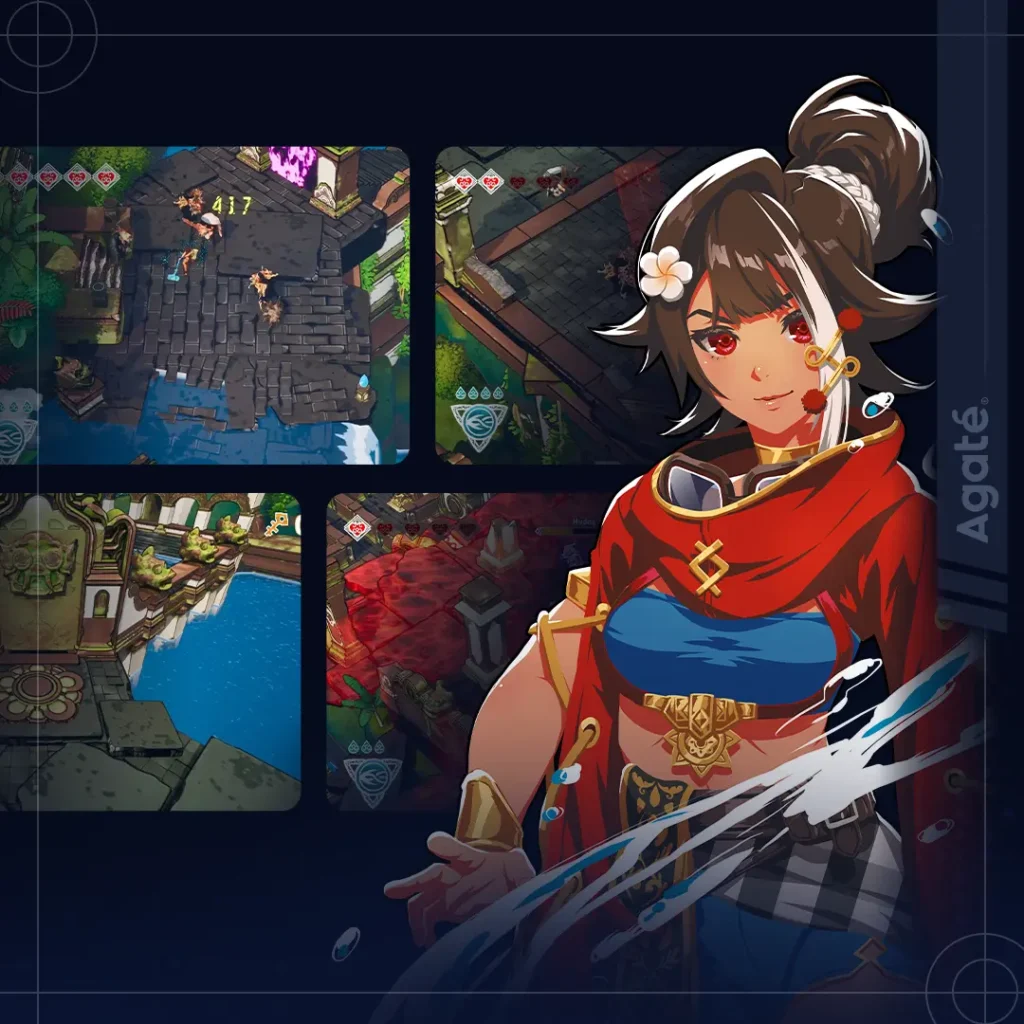
Imagine stepping into a game where the environment, the characters, and even the myths feel like home. The streets resemble those from your childhood, the characters speak phrases you grew up hearing, and the legends are woven into the story mirror tales passed down through generations. Suddenly, the game is beyond just entertainment, but it’s a reflection of your identity. Source: Newzoo, 2024 This sense of cultural connection is what modern players crave. According to a 2024 Newzoo report, 65% of players are drawn to games with deep and compelling narratives. Furthermore, 68% of these players emphasize the importance of inclusive storytelling and cultural representation when selecting which games to play. Games that embrace cultural depth are no longer just artistic expressions; they are essential in captivating audiences worldwide. Representation in video games significantly impacts whether players choose certain titles over others. According to the Global Gamer Study by Newzoo, over half (57%) of players reported that they avoided certain games because they felt those games weren’t made for them. Interestingly, this sentiment remained relatively consistent across all generations, with 54% to 58% of players agreeing with the statement. This data highlights a critical challenge for game developers: failing to include diverse perspectives in storytelling can alienate large portions of potential audiences. The Significance of Cultural Diversity in Games Cultural diversity in video games isn’t just about representation. It creates meaningful connections by allowing players to see themselves in characters, narratives, and worlds. When games embrace diverse cultures, they become more immersive, inclusive, and engaging. Inclusivity Including diverse characters and cultural contexts fosters a sense of belonging within the gaming community. Players from different backgrounds feel seen and valued, which enhances their emotional connection to the game. Increased Engagement By incorporating diverse cultural elements, developers can reach a broader audience and enhance engagement levels. Players who see their cultural identities reflected in the game world are more likely to become invested in its characters and storylines, leading to stronger community engagement and prolonged playtime. Realism and Authenticity A well-researched portrayal of different cultures provides a more immersive experience, allowing players to explore new perspectives and appreciate global diversity. By accurately depicting traditions, languages, and histories, games can serve as a medium for cross-cultural learning and appreciation. Infusing Cultural Identity in Blades of Mirage At Agate, we recognize the impact of cultural representation in gaming and have taken deliberate steps to incorporate these elements in our latest development, Blades of Mirage, a collaborative project with Red Dunes Games. This game introduces a world inspired by Southeast Asian cultures, integrating folklore, traditional attire, and architectural influences into its world-building. Blades of Mirage captures the essence of Southeast Asia through: Folklore-Inspired Characters The storyline is influenced by regional mythology, incorporating legendary figures and historical events that resonate with local traditions. Aesthetic Authenticity From Mira’s attire to the ruined temples she explores, every detail is crafted with care. The environmental designs echo the rich architecture of Southeast Asia, featuring intricate carvings, stilted wooden houses, and temple complexes reminiscent of Borobudur and Angkor Wat. Ambience Influence The game’s environmental soundscapes immerse players in the setting. Whether navigating dense tropical forests, exploring ancient temples, or uncovering secrets in deep caves, the ambient audio captures the essence of Southeast Asian landscapes, complete with the echoes of waterfalls and wildlife. Be Part of the Journey Cultural representation in games is not just a passing trend but a defining factor in how stories are told and experienced. Blades of Mirage aims to offer a rich and immersive experience that brings Southeast Asian culture to the forefront of gaming while delivering a gripping adventure for players worldwide. As we gear up for the release, we invite you to be among the first to explore this world of legends, myths, and unforgettable battles. Add Blades of Mirage to your Steam Wishlist today and be ready to embark on an adventure where culture and storytelling come alive like never before!
Dev Story: Bringing a Multiplayer Vision to Consoles with ArcRunner
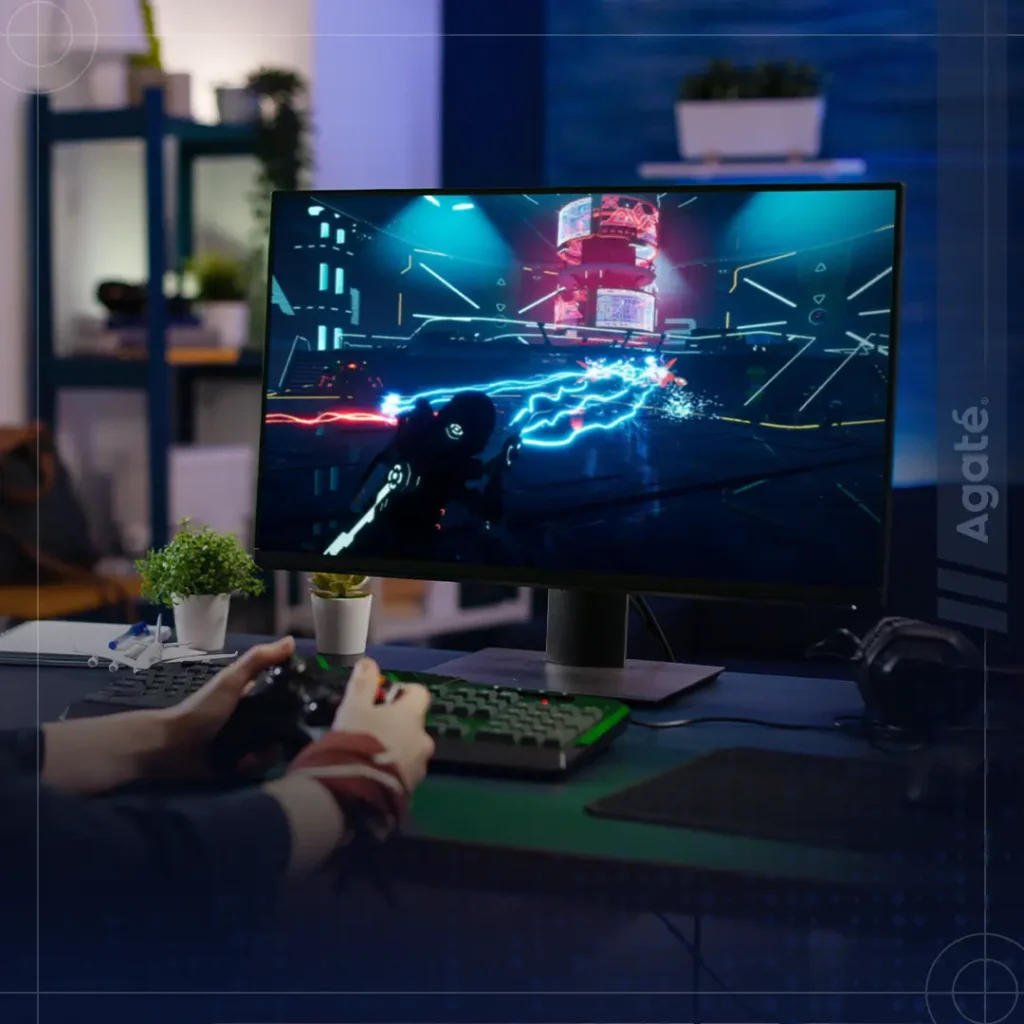
With the rising demand for connected experiences on consoles, players are increasingly drawn toward games that offer robust multiplayer features. As a result, multiplayer gaming on consoles continues to gain momentum, offering huge opportunity to boost player engagement. This trend underscores the need for game developers to deliver high-quality multiplayer experiences on consoles that keep players engaged and invested. When Agate’s porting team took on the challenge of bringing ArcRunner to consoles, it stood out with its sci-fi cyberpunk style, a fresh genre for the Indonesian market. It was also one of the first third-person multiplayer shooters we had the opportunity to port, making this project exciting to test our crew capability. This project added another successful Unreal Engine title to our portfolio, moving beyond prototypes to a fully released game. It also expanded our expertise as we were venturing into new territory by bringing ArcRunner to Xbox Series S/X dan PlayStation 5. Overcoming Challenges, One Step at a Time When we joined the ArcRunner project, the project was already in progress, but some significant challenges had stalled its development. At this point, we knew we had to step in and turn things around. Setup Multiplayer on Console To be able to setup multiplayer, there are libraries need to be setup on the game and the backend. Performance Optimization At the beginning, we set our priority for performance optimization. The game was struggling with low FPS and delivering a smooth and responsive experience was crucial for a fast-paced shooter like ArcRunner. Localization Localization also presented unexpected hurdles. Two language codes that were strikingly similar caused conflicts in the game’s text system. We dove into the intricacies of the localization process, ensuring every piece of text was displayed correctly and consistently across all regions. How We Made It Happen With its fast-paced multiplayer gameplay, we encountered and overcame unique challenges that tested our expertise. By diving into multiplayer library manuals and customizing configurations, we brought multiplayer features to ArcRunner for each console. Our solutions to the challenges included: Setup Multiplayer Libraries Each console has their way to setup for multiplayer libraries. We must get familiar with that. We must also handle console invitation and disconnection case. Preventing Session Leaks Development servers ensure safe testing environments, avoiding unintended live interactions. When it is submitted to platform certification, we must change it to Live Server. Platform Compliance From decoding C++ libraries & Unreal blueprint, crafting consoles invitation handlers to implementing UI adjustment, we tested and addressed every edge case, including disconnection scenarios and library that must be called per session. Performance Optimization We analyzed console performance metrics, adjusting visuals and recreating shaders for consistent quality across platforms. Generating LOD, optimize textures, recreate post process, and lighting adjustment are part of jobs. We also need to inspect the root causes when stutter happens. Adding new features Adding new features like vibrations and adaptive trigger to enrich the gameplay when getting hit or trigger the weapons. Besides that, we also need to implement some mandatory console features. Rendering Innovations Shader compatibility issues were solved through creative exploration of rendering options. Some consoles also need to be adjusted in color because there are differences in color result. Localization Adjustment We need to add some new words to localization table for achievement, terminology, and new UI that we create. However, beyond overcoming the technical challenges, all the success of this project was attributed to the result of strategic planning, collaboration, and relentless effort. We started by sharpening our expertise, conducting knowledge-sharing sessions with industry veterans who have extensive experience in multiplayer development. This investment gives our team the technical foundation needed to address ArcRunner’s unique challenges. “Success in a complex project like this comes down to meticulous planning and strong collaboration. By setting clear milestones and giving each team member ownership of a specific platform, we turned challenges into a well-orchestrated process,” said Aswin Juari, Tech Director of Porting Services at Agate. A Project That Redefined Our Capabilities Through ArcRunner, we didn’t just port a game but also grew as a team. We pushed our technical skills, expanded our platform expertise, and strengthened our abilities to deliver complex multiplayer experiences. This project wasn’t just about overcoming obstacles, but it was also about testing our capability and setting a new standard for what we do. If you’re looking for a partner who brings passion, expertise, and dedication to every project, Agate is ready to help you bring your game to new heights. Reach out to us at contact@agate.id, and let’s create something extraordinary together.
The IKEA Effect in Gamification: Harnessing Player Engagement
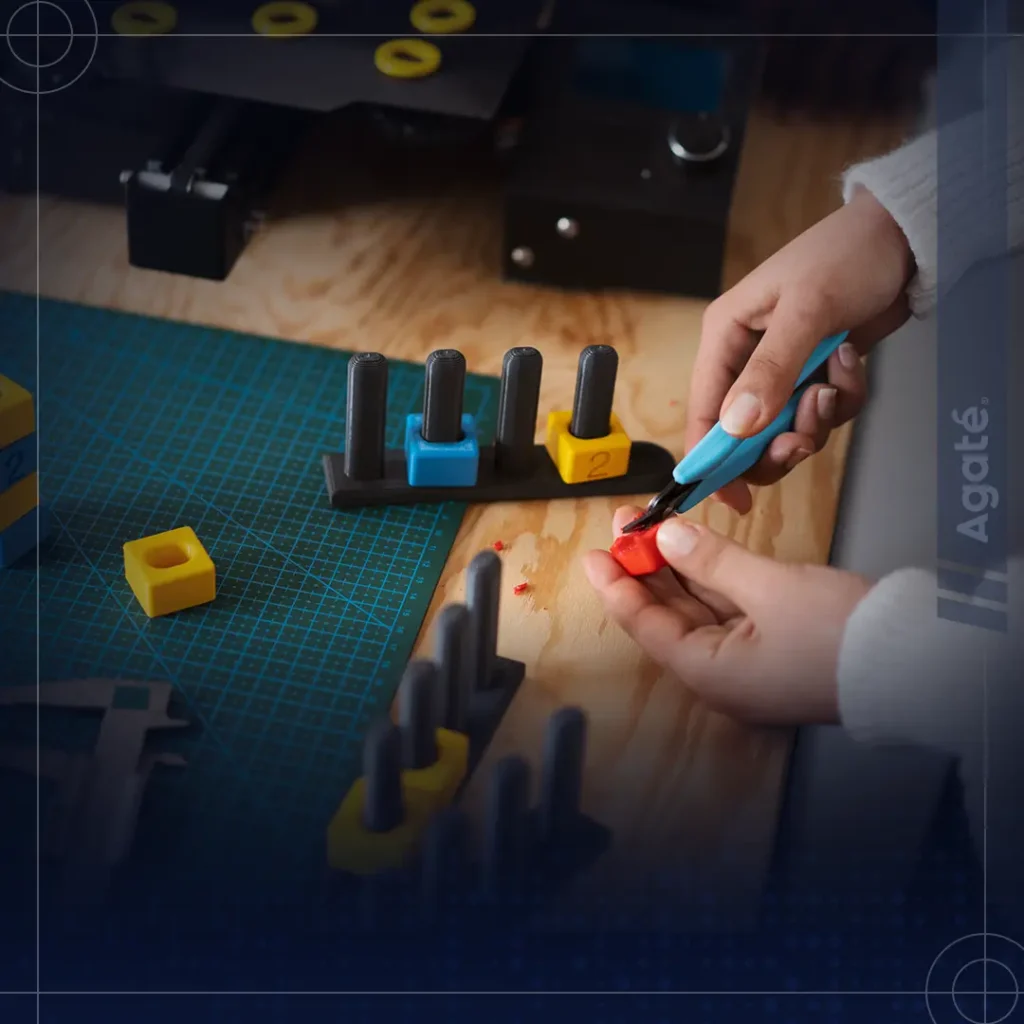
In today’s evolving gaming landscape, the challenge isn’t just about delivering visually stunning graphics or captivating narratives—it’s about fostering a deeper connection between players and the worlds they explore. This requires more than just technical mastery or creative storytelling;. It it demands a deeper psychological strategy. One such psychological principle that has proven transformative in this regard is the IKEA Effect, a psychological phenomenon that highlights how people place greater value on things they have helped create. First identified by psychologist Michael Norton in 2011, the IKEA Effect explains why we feel a stronger attachment to something we’ve invested effort into, even if it’s imperfect. As a game developer, understanding the IKEA effect opens opportunities to deepen your players’ engagement with the game. By giving players the chance to invest creatively in the world of the game, developers could foster a sense of ownership and attachment that goes beyond what traditional pre-made content can offer. Core Cognitive Principles in The IKEA Effect The IKEA Effect is rooted in three major cognitive principles that shape human behavior and perception. These are the need for competence, the concept of effort justification, and the endowment effect. Competence Legendary behavioral scientist Albert Bandura demonstrated this effect in his 1977 paper when he showed how successfully completing tasks increased people’s feelings of competence and control. Effort justification Effort justification is where people elevate the value of outcomes they struggle to achieve. Nobody likes to think they’ve wasted time and energy in pursuit of a worthless goal, so we tend to view our aims as more valuable than they are. Endowment effect This cognitive bias occurs when individuals overvalue items they personally associate with. In games, the sense of ownership players feels over elements they create, or influence amplifies the perceived worth of those contributions. While the endowment effect focuses on connection, the IKEA effect highlights how effortful creation deepens that connection. Together, these biases form a powerful dynamic that enhances player engagement. The IKEA Effect in Gamification In the context of gamification, this effect can be harnessed to enhance user engagement. By allowing users to contribute to the creation or customization of content, platforms can increase users’ perceived value of the experience. This sense of ownership and personal investment leads to higher engagement and satisfaction. For instance, when users assemble or customize elements within a platform, they are likely to develop a stronger attachment and value the experience more highly. How can the IKEA effect be used in gamification? Encourage users to be co-creators Encourage users to be co-creators by actively seeking their input and involving them in shaping the experience. Whether through feedback, content creation, or design choices, allowing users to contribute strengthens their sense of investment and connection. Empower personalization with configurators Allow users to tailor their experiences through interactive product configurators. By enabling them to shape elements of the platform or service, you increase their sense of ownership and commitment to the final product. Challenge minds with interactive puzzles Engage users through quizzes, visual challenges, and problem-solving activities. When users invest effort to uncover information or complete a task, their sense of accomplishment heightens their attachment to the platform. Gamification by Agate Agate, through Level Up powered by Agate, has embraced the IKEA Effect in its gamification projects, creating experiences that drive significant user engagement. Our collaborations with L’Oréal and Erajaya stand as prime examples of this approach. L’Oréal crafted an engaging “MYSLF Discovery Game” – a word search experience designed to weave a narrative around the MYSLF perfume. Players embarked on a journey to discover words that embodied both the essence of the fragrance and the wearer’s personality. This approach fostered a sense of ownership and connection between the player and the product, helping to generate over 7,000 leads. Erajaya Group continued its success of using gamification to celebrate milestones and engage its customers in 2024 through Cari Kata games. This word search game not only attracted new users but also strengthened the bond with Erajaya’s loyal customers, contributing to the success of the Eraversary campaign. The game achieved remarkable results, generating over 16,000 sessions throughout the 2024 campaign. Ready to create a game that engages players on a deeper level? Get in touch with our team at enterprise@agate.id for gamification services that prioritize player engagement and retention. Let us help you incorporate The IKEA Effect in your gamification projects.
Story from GameDev Summit
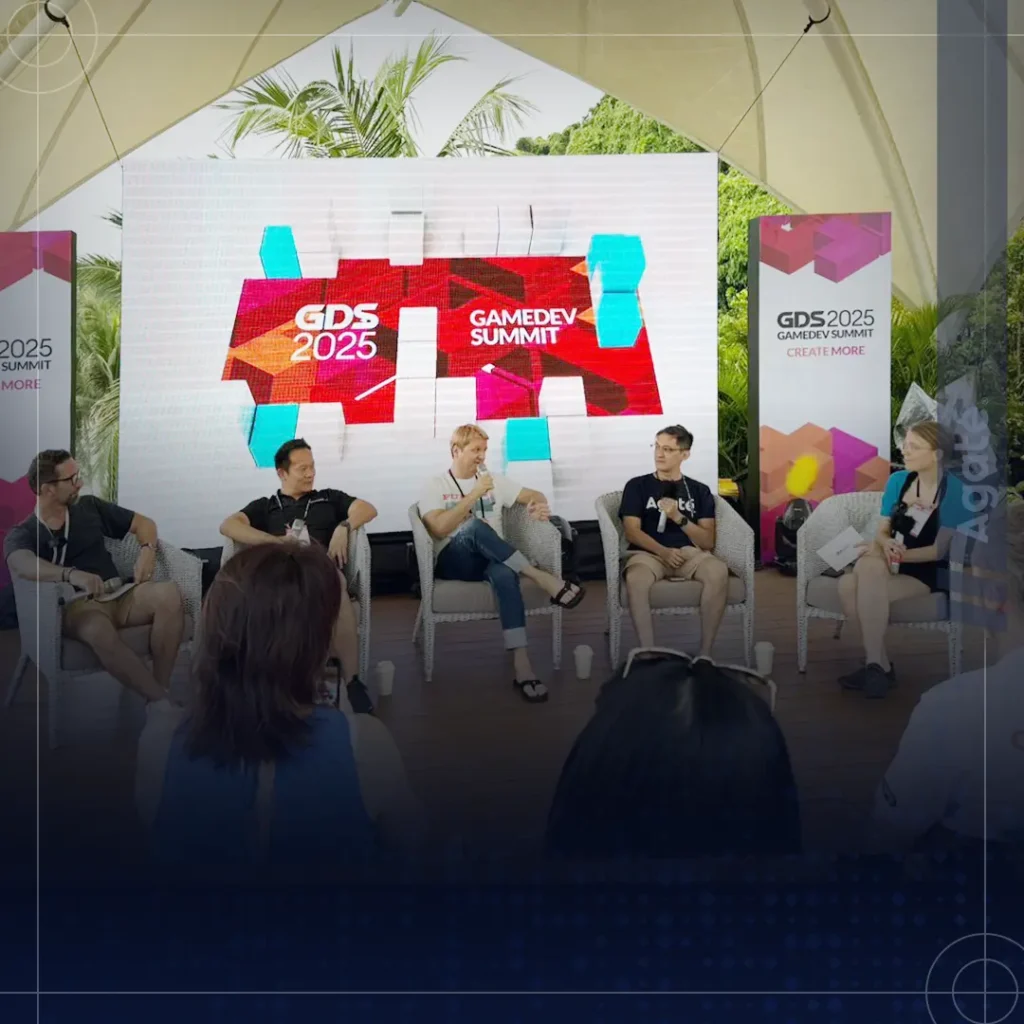
Earlier this month, Agate’s Director of Business Development returned from GameDev Summit 2025, held against the stunning backdrop of Boracay’s beaches. Beyond the breathtaking scenery, the event offered invaluable conversations with industry veterans, making it an enriching experience for us. Designed to foster conversations and build relationships, the event created an inclusive space for emerging SEA service providers, ensuring visibility beyond the dominance of giant players. This focus on inclusivity made it especially valuable for newer companies looking to break into the global market. Marking our second appearance at the event, it was exhilarating to witness the rapid growth of Southeast Asia’s external game development industry. With around 300 attendees from 139 companies—from small game studios to gaming giants—the summit was a true melting pot of opportunities and insights. Sharing The Stage with Industry Leaders Agate’s Director of Business Development, Vincentius Hening W. Ismawan, takes the stage at the event, bringing “Breaking Barriers in Southeast Asian Game Development” topics along with other notable panelists at Mythbusters Panel Series, including Steve Taylor, Director of Business Development at TransPerfect, Mihai Pohontu, CEO of Amber, Charles Tang, Founder and CEO of Youniverse Games, and moderated by Juney Dijkstra, Operations Director at EA XDI. Together, they debunked common myths about the SEA gaming industry and highlighted its immense potential as a global hub for innovation, collaboration, and growth. Drawing from 16 years of experience building Agate, Vincent shed light on the region’s highly skilled talent pool, its ability to handle complex projects, and the effectiveness of distributed teams—dispelling misconceptions about quality, communication barriers, and operational challenges. Beyond Professional Networks: Cultivating Deeper Connections GDS redefined industry networking with a unique approach—dedicating an entire day to non-work activities. This relaxed setting fostered deeper connections, allowing participants to bond beyond business discussions. Many attendees praised this format for creating lasting relationships that go beyond professional exchanges. “As a fellow Southeast Asian, I’m incredibly proud to see our region thriving in the global game industry with our unique traits. I believe everyone is eager to see the continued success of this event.” Vincentius Hening W. Ismawan Director of Business Development at Agate Looking Ahead GameDev Summit 2025 reaffirmed Southeast Asia’s position as a rising force in the global gaming industry. At Agate, we remain committed to fostering innovation and collaboration across the region. We look forward to more breakthroughs, partnerships, and milestones that will propel SEA’s gaming community even further. If you are interested in exploring opportunities in Southeast Asia for gaming, reach out to us at enterprise@agate.id.
Agate Seasonal Pause: Charting New Horizons While Nurturing Local Growth
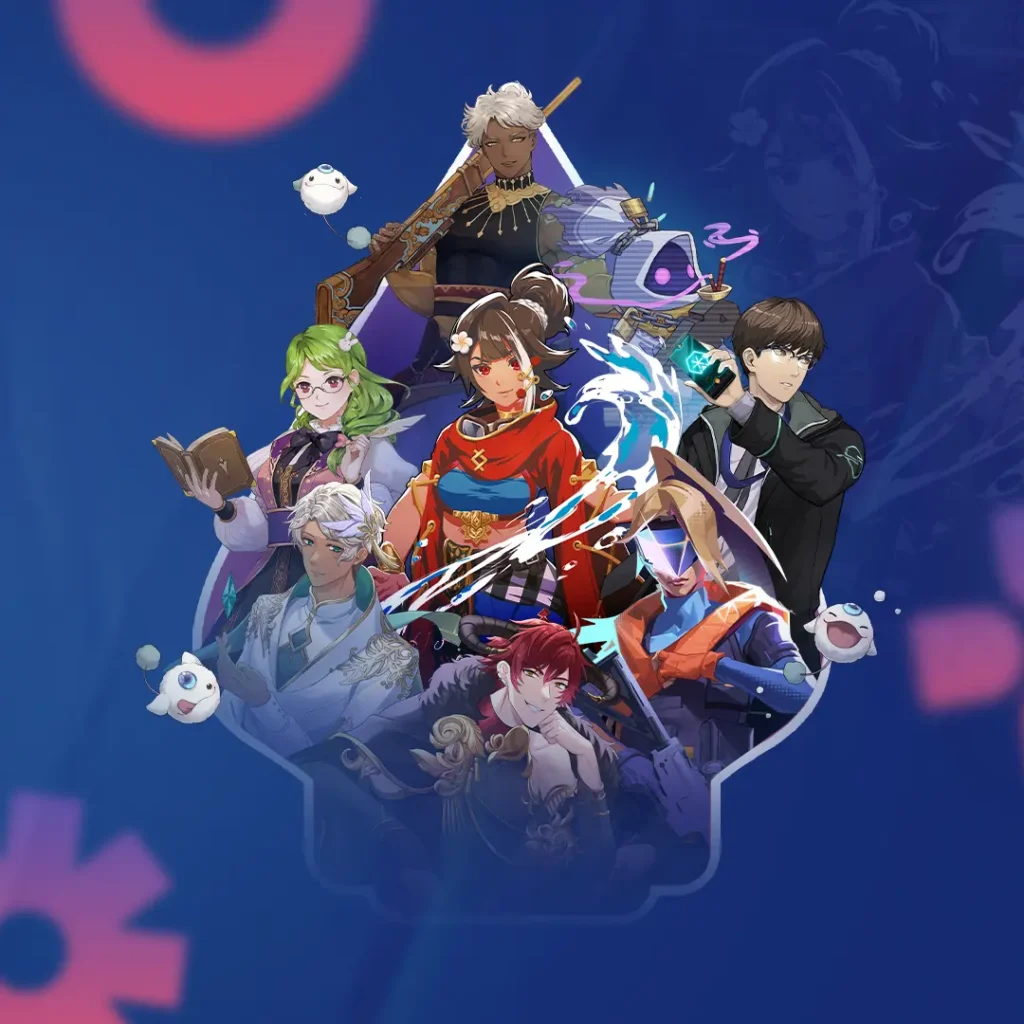
As the end of 2024 approaches, we pause amidst the rhythm of progress to reflect on a rewarding journey. Like the turning of seasons, this year has brought its share of trials and triumphs, each shaping our resolve to grow globally while remaining steadfast in our commitment to nurturing the local gaming ecosystem. For Agate, 2024 has been a year of remarkable progress. Through various initiatives, we have expanded our global footprint while staying deeply rooted in our mission to foster growth within the Indonesian gaming community. Milestones such as the establishment of a new global representative in the United States, attained the ISO/IEC 27001: 2022 certification, the launch of Agate Game Course for Teacher, our Academy becoming an Unreal Authorized Training Center, and exploring new regions through a partnership with the United Arab Emirates-based game studio have strengthened our resolve to create a meaningful impact both locally and globally. We are profoundly grateful to everyone who has been part in shaping this year’s journey. Together, we have crafted stories of expanding our global reach while continuing to grow Indonesia’s game ecosystem. Balancing both has not been easy, but thanks to our talented team and the trust of our esteemed partners, we have made it possible. Solidifying Our Global Footprint 2024 marked a pivotal year in cementing our position on the global stage by establishing a new representative in the United States, bringing the total to five global representatives—Canada, Germany, South Korea, Japan, and the United States. With the addition, we ventured further into the North America region and expanded into the Middle East and North Africa (MENA) region, broadening Agate’s market coverage across Asia, Europe, North America and now the Middle East and North Africa. This year also served as a testament to our commitment to data security, as we successfully attained the ISO/IEC 27001: 2022 certification for our information security management systems. This accomplishment underscores our commitment to global expansion and reinforces our position as a powerhouse in the Indonesian gaming sector by ensuring company data and information adhere to international standards. We also noticed a growing trend in external development within the global game industry. Earlier this year, we launched Vertx Break powered by Agate, our sub-brand to provide 3D Stylized Art, helping us meet the increasing demand for stylized visuals in the global market. To crown our global efforts, Agate proudly participated in 28 international events this year, establishing our presence across Asia, Europe, North America, and Australia. Remarkable Stops at Global Events Driven by our ambition to expand our reach locally and globally, we attended various events throughout 2024. Although each event has its own story, some of them, in particular, left a lasting impression on us. Game Prime In our ongoing effort to promote local games to a wider audience, Agate’s participation in Game Prime 2024—one of the largest game conventions in Indonesia—is a highlight worth mentioning. Held in August in Jakarta, this year’s event showcased the best of local games to a diverse audience. After an offline hiatus, Game Prime made a grand return through a collaborative effort involving the Ministry of Tourism and Creative Economy (Kemenparekraf), the Indonesian Game Association (AGI), and gaming media outlets GGWP.ID, uniting gamers and enthusiasts from across the archipelago. External Development Summit (XDS) This September marked our second appearance at XDS, a premier event for external game development. Held in Vancouver, Canada, the event was transformative, offering invaluable opportunities to build relationships, exchange ideas, and gain fresh perspectives on the future of the gaming industry. Tokyo Game Show In our unwavering commitment to bringing local games to the global stage, we participated in Tokyo Game Show 2024, Asia’s largest game convention, joining the booth of Red Dunes Games, an indie game studio from the United Arab Emirates, founded by avid gamers. Held in September in Chiba, Japan, the event connected us with over 250,000 attendees and served as a prime platform for gaming enthusiasts, developers, publishers, and other industry partners to explore exciting new updates around the game industry. G-STAR As the epicenter of esports and gaming innovation, South Korea hosted G-STAR 2024 in Busan this November. Celebrating its 20th anniversary, this iconic convention exemplified the vibrancy of the gaming industry. Agate seized the opportunity to engage with a bustling crowd of over 200,000 attendees. Sustaining Our Growth Trajectory with Amazing Partners We believe that partnerships are invaluable, as they open up opportunities that would not have been possible otherwise. This year, together with our partners, we have achieved impactful results: PQube PQube is a British game publisher and distributor of interactive entertainment, with a strong presence across Europe, the UK, the Middle East, Australia, North America, and South America. PQube has been a strategic partner in Agate’s journey to deliver innovative games to players. This year, Agate and PQube collaborated to bring Celestia: Chain of Fate, ArcRunner, and The Bridge Curse 2 to the global gaming community. L’Oreal L’Oréal, the world’s leading beauty and cosmetics company, partnered with Agate, to enhance the promotion of YSL MYSLF perfume through an engaging mini-game, MYSLF Discovery Game. This creative approach to brand engagement went beyond traditional advertising, delivering an engaging and memorable experience for users in 60 days. The MYSLF Discovery Game allowed customers to explore and develop a deeper connection with the YSL MYSLF perfume. Goblinz Studio Goblinz Studio is a French game developer specializing in tactical, management, and RPG games. Together, Agate and Goblinz Studio are bringing Beneath Oresa, a fighting roguelike deckbuilder, to new platforms—PS5, PS4, Xbox One, Xbox Series X/S, and Nintendo Switch—ensuring its unique gameplay reaches an even broader audience. Digital Happiness Digital Happiness is an Indonesian game studio, best known for its hit release, DreadOut. Agate partnered with Digital Happiness as one of the publishers for their new game, DreadHaunt, which was released in September this year. DreadHaunt is an immersive survival horror and deception game that combines the thrill of cooperative gameplay with a gripping, narrative-driven solo experience. It is now
Redefining SEA Digital Growth: A Thriving Region for Gaming Sectors

As 2024 reach its final quarter, the digital economy in Southeast Asia (SEA) continues to surge, fueled by robust growth across sectors such as e-commerce, food and transport, travel, and online media. Among these, SEA stands out as a rising star in the global digital economy, demonstrating resilience and adaptability in the face of inflationary pressures and evolving market dynamics. Source: e‑Conomy SEA 2024 Report In 2024, SEA’s digital economy achieved remarkable progress, recording double-digit year-on-year (YoY) growth in Gross Merchandise Value (GMV) and revenue. According to the recently released e-Conomy SEA 2024 report by Google, Temasek, and Bain & Company, GMV climbed to an impressive USD 263 billion, with 15% increase from last year, while revenue soared 14% to USD 89 billion. This consistent growth reflects the region’s ability to navigate global economic challenges while embracing new opportunities, making SEA an attractive destination for investment across various industries. Gaming Sectors in SEA’s Digital Boom With the digital economy booming across various sectors in SEA, online media—including gaming, video, music, and ads—has shown a positive trajectory over the past three years. This sector continues to maintain overall profitability, driven by increasing investment in ad monetization efforts by digital players. Source: e-Conomy SEA 2024 report by Google, Temasek, and Bain & Company Among SEA’s thriving online media sectors, gaming stands tall as one of the fastest-growing industries, with the sector contributing 16% to the overall year-on-year growth across online media sectors in 2024. This notable performance underscores gaming’s central role in the digital economy’s expansion. A burgeoning gamer base has not only elevated e-sports in SEA to new heights but has also spurred a demand for localized content. Game developers in SEA are meeting this demand by incorporating regional languages and cultural nuances into their creations, enriching the gaming experience for a diverse audience. Mobile Gaming as Region’s Powerhouse Game developers in SEA are capturing a growing share of global mobile game downloads and revenue. This success is not limited to major studios, as indie games also play a pivotal role in driving growth across the region. According to Southeast Asian Mobile Game Market Insights 2024 by Sensor Tower, the mobile game downloads in the Southeast Asian market grew by 3.4% period-on-period to 4.2 billion in the first half of 2024. Indonesia stood out as the driving force behind this growth, contributing over 41% of the region’s total mobile game downloads. From January to August 2024, mobile game downloads in Indonesia surged by 10%, making it the fastest-growing market in Southeast Asia and cementing its position as a regional leader in this metric. Source: Southeast Asian Mobile Game Market Insights 2024 A Window Opportunity for Investing in Indonesia Gaming Market Indonesia’s position as a hub for mobile gaming extends beyond its impressive download numbers. As the 16th largest market globally and a leader in SEA, the country’s vibrant creative ecosystem, fueled by a thriving community of gaming content creators, makes it a key player in delivering localized and culturally rich gaming experiences. Source: e‑Conomy SEA 2024 Report The rapid growth of digital creators is another reason Indonesia stands out as an attractive market for game developers. According to the e‑Conomy SEA 2024 report, gaming content creators dominate Indonesia’s digital landscape, making gaming the most popular category among creators, who are leading the charge compared to other categories. With the rapidly evolving market, Indonesia reflects a perfect confluence of factors—a young, tech-savvy population, widespread smartphone penetration, and increasing access to affordable internet. These conditions create a fertile ground for innovation and experimentation in gaming Key Strategies for Game Expansion: Localization and Cultural Integration For businesses aiming to thrive in this dynamic market, localization and cultural infusion are essential. This strategies are include: Cultural Resonance Developing games that reflect local traditions, languages, and values to build a deeper connection with the audience. Adding culturally relevant characters, stories, and settings can significantly enhance engagement. Language Accessibility Offering multilingual options ensures broader reach, especially in a linguistically diverse region like SEA. Collaborating with Local Creators Partnering with gaming influencers and creators helps tap into established communities, fostering organic growth and trust among local audiences. Regional Adaptations Designing games that cater to varying internet speeds and device specifications, ensuring inclusivity across diverse socio-economic groups. Tap Into SEA Market with Agate As the leading game development company in Indonesia and Southeast Asia, Agate is uniquely positioned to capitalize on these opportunities. By prioritizing localization and cultural integration, Agate has successfully built games that resonate with both SEA and Indonesian audiences. Agate’s approach also involves tailoring gaming experiences to the unique needs of the region, from technical optimization for diverse platforms to culturally enriched narratives. Contact our team at enterprise@agate.id and let’s make the next big hit in Southeast Asia.
Story from G-STAR and DevGAMM Lisbon

November was a dynamic and rewarding month for Agate as we took part in two prestigious gaming events: G-STAR 2024 in South Korea and DevGAMM Lisbon in Portugal. These global showcases offered unparalleled opportunities to network with industry leaders, gain valuable insights, and further solidify our presence across Asia and Europe—two of the most vibrant gaming markets in the world. A Game-Changing Experience at G-STAR 2024 South Korea is often considered the epicenter of e-sports and gaming innovation, where gaming cafes are not just venues but cultural landmarks. G-STAR 2024, celebrating its 20th anniversary, exemplified this vibrant landscape. The convention reflected the rising trend of multiplatform gaming with showcases across mobile, PC, and console platforms. With Nexon’s return as the main sponsor after seven years, industry giants like Netmarble, Krafton, and Pearl Abyss unveiled exciting new titles. Agate seized this opportunity to engage with a bustling crowd of over 200,000 attendees, including a growing number of international participants at the B2B sessions. The meeting area buzzed with activity throughout the event. Sharing View from Indonesia’s Game Industry Our Head of Business Development Vincentius Hening W. Ismawan, made a significant impact by speaking at the Capacity Building Workshop organized by the ASEAN-KOREA Centre, during the event. His panel with CEO of Digital Hearts Seoul Homin Kim, Partner of KPMG Korea Joohun Yoon, CEO and Design Director of BattleBrew Production Shawn Toh, moderated by CEO of NC America Jeonghee Jin (JJ), highlights on global presence strategy and sustaining a business in the game industry amidst fierce competition and disruptive trends resonated with many attendees. The event served as a platform for industry experts to delve into key topics shaping the gaming industry’s future, from emerging technologies to innovative business strategies. “Amazing panel discussions with inspiring leaders shared diverse perspectives on thriving in the gaming landscape.” said Vincentius. Learn from a Stellar Roster at DevGAMM Lisbon While G-STAR illuminated the bustling gaming market of Asia, DevGAMM Lisbon offered a deep dive into the current state of Europe’s gaming industry, where the focus shifted toward surviving and sustaining businesses in 2024. Our Business Development Manager Ardita Silvadha Erlangga, returned with a renewed sense of purpose, having engaged with an incredible lineup of speakers, panels, and networking sessions. With the gaming industry facing challenges, especially in Western markets, the conference emphasized the importance of not only weathering economic challenges but also ensuring long-term stability through strategic partnerships and innovation. Quoting Ardita, “The focus is shifting towards building sustainable strategies. DevGAMM inspired us to not just endure but to innovate for the future.” Agate’s active participation in DevGAMM underscored our commitment to playing a meaningful role in Europe’s gaming ecosystem. From exploring collaborative opportunities to presenting our diverse portfolio, we demonstrated how creativity and strategy can drive sustainable growth. Our commitment to this market is evident through our partnerships with prominent European clients like PQube, a leading publisher with a global footprint. Together, we’ve collaborated on several groundbreaking titles, including: Celestia: Chain of Fate A romance-fantasy visual novel that blends captivating narratives with a magical world of angels and demons. ArcRunner A cyberpunk roguelite that takes players on an adrenaline-fueled mission aboard a futuristic space station. The Bridge Curse 2: The Extrication A spine-chilling survival horror game inspired by a Taiwanese ghost story. Bridging Continents, Strengthening Impact These events reaffirmed Agate’s role as a global player in game development, from visual novels to action-packed roguelites and immersive horror games. Whether you’re looking for a full-cycle game development partner or porting solutions, Agate’s expertise can bring your vision to life. Let’s build something extraordinary together. Explore our services and portfolio to see how we can support your next project. Reach out to us, click here.
Story From Edutech Asia
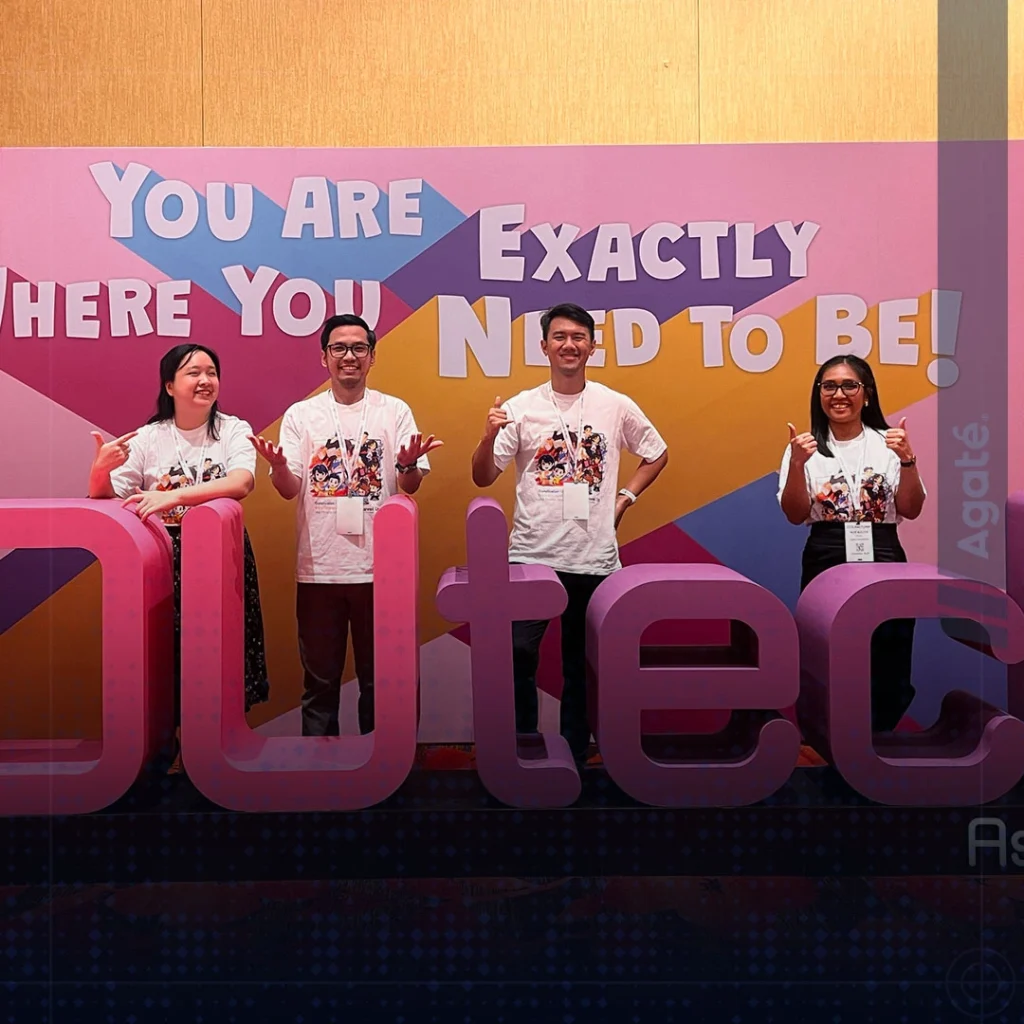
Earlier this month, our gamification division, Level Up powered by Agate wrapped up its participation at EDUtech Asia 2024, the largest conference and exhibition for educators and EdTech providers in Asia. As first-timers at this prestigious event, the experience has been nothing short of extraordinary, leaving us energized and inspired by the opportunities and connections it offered. Bringing Gamification to the Forefront As one of Southeast Asia’s leading gamification providers, we were proud to showcase our innovative solutions through Level Up powered by Agate. Our offerings span a variety of platforms, including mobile apps, PC, web-based solutions, and VR, all designed to enhance learning, assessment, training, and simulation. Our booth became a dynamic space where attendees explored the transformative power of gamification. From interactive demos to in-depth discussions, we demonstrated how our solutions can drive engagement, foster skill development, and deliver measurable outcomes in education and beyond. A Rewarding Experience Participating in EDUtech Asia 2024 offering invaluable opportunities to share our vision and expertise. Junialdi Dwijaputra, our Head of Level Up powered by Agate, and Hisyam Hesbi Wijonarko, our B2B Marketing Executive, expressed their appreciation for the event. “In one way, showcasing Level Up powered by Agate’s gamification solutions for learning, assessment, training, and simulation at EDUtech Asia 2024 was the icing on the cake. The lively reactions of the participants’ reassured that there is a market for more creative, more diversified methods of engagement and skills development. What was most interesting was that a good number of the attendees were already quite versed with gamification – a welcome change from other events we have attended. This achievement, therefore, demonstrates the importance and relevance of our solutions and, unbelievably, fits well with our 2025 vision: increasing our footprint in Southeast Asia and providing innovations that add value to the region,” said Junialdi Dwijaputra, Head of Level Up powered by Agate. Quoting Hisyam Hesbi Wijonarko, B2B Marketing Executive of Level Up powered by Agate, “EDUtech Asia 2024 was a defining moment for Level Up powered by Agate. Showcasing our gamification solutions to educators, tech leaders, and innovators emphasized the rising demand for engaging and tech-driven learning tools, reaffirming our impact in transforming education.” On the other hand, Auliya Hidayati, Senior Business Development Manager, emphasized, “EDUtech Asia 2024 was an incredible experience for Level Up powered by Agate, marking our first time showcasing our solutions in the region. It was inspiring to see immersive learning, gamified experiences, and AI personalization taking center stage, and hearing directly from potential clients about their needs and experiences with gamification. As a team passionate about gamification for over a decade, this event validated our work and motivated us to keep innovating to make education fun, impactful, and unforgettable while shaping the future of learning in this region.” Engaging with Industry Leaders One of the most exciting parts of this event was the opportunity to connect with prominent industry leaders, including Belva Devara, Founder and CEO of Ruangguru, Indonesia’s leading EdTech company. His visit to our booth sparked an engaging dialogue about the potential of gamification in addressing educational challenges on a larger scale. The exchange of ideas with industry figures underscored the importance of collaboration in driving innovation. These interactions reinforced our belief that gamification is not just a trend but a critical enabler of change in education. Exploring Cutting-Edge Technologies Our booth wasn’t just about showcasing existing solutions—it was a gateway to exploring the future. Attendees were particularly captivated by our hands-on demo featuring the Apple Vision Pro, which illustrated the possibilities of blending immersive technologies with gamification. We also provided consultations tailored to educators and organizations seeking to harness gamification for enhanced outcomes. From personalized learning experiences to gamified training modules, we delved into how gamification can be adapted to meet diverse needs while stay ahead the latest technological trends. Level Up with Us At Level Up powered by Agate, we believe in unlocking potential through engagement and fun. Whether it’s gamified learning platforms or gamified marketing campaigns, our mission is to empower individuals and organizations to achieve their best. Connect with us at enterprise@agate.id and let’s level up your marketing and learning with gamification!
Story from Gamescom Asia
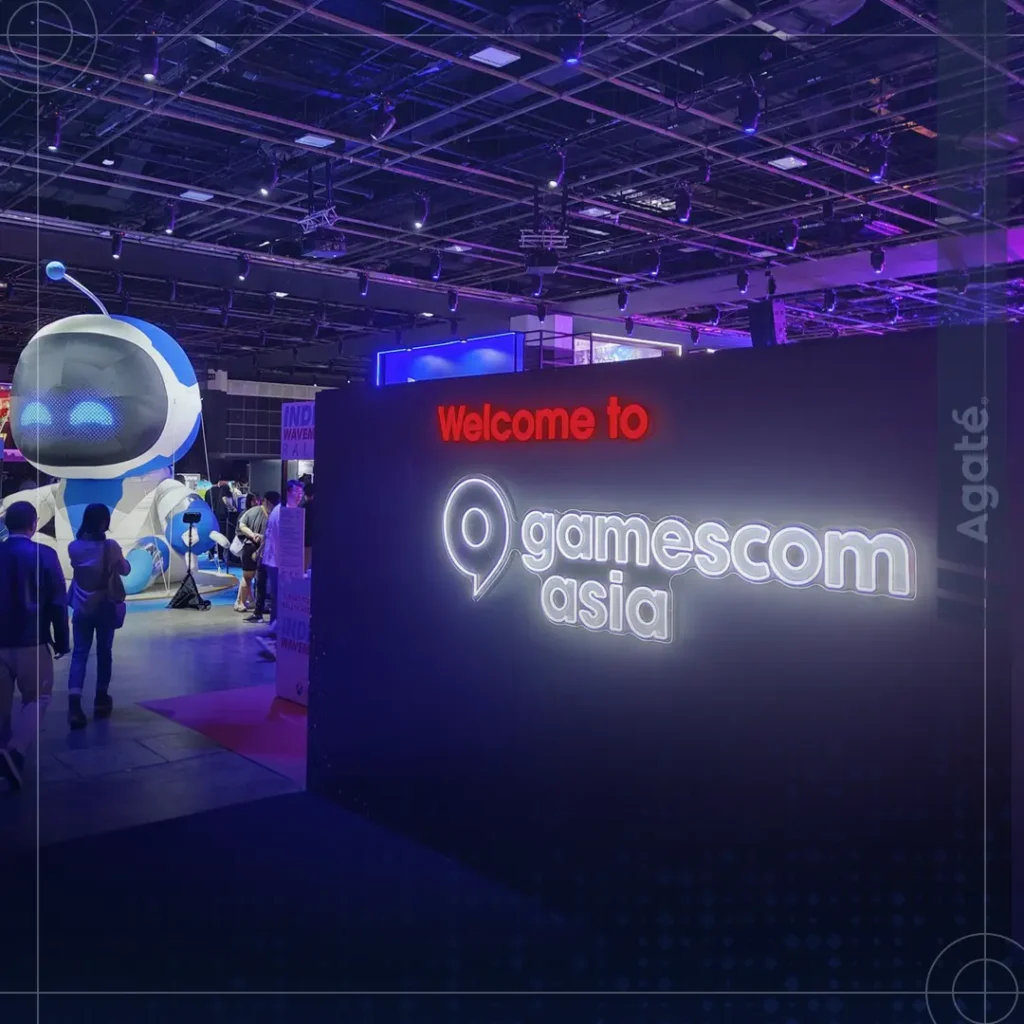
The excitement at Gamescom Asia this year highlights Southeast Asia’s rise as a powerhouse for gaming innovation and cross-border collaboration. This event is more than just showcase; they are shaping the future of the gaming industry globally. With more than 41,000 attendees from 78 countries, Gamescom Asia once again proved to be a melting pot of ideas, creativity, and cutting-edge technology. From indie gems to AAA, this year’s event featured over 120 games and hosted numerous insightful discussions led by industry experts. The mix of talent and tech on display underscored the growing diversity and creativity of the region’s gaming scene, where indie developers proudly shared the stage with major players, each pushing the envelope in unique ways. Bringing Local Games to The Global Stage Among the varied genres showcased, horror games emerged as a standout, particularly those from Indonesia. The popularity of horror titles underscores Southeast Asia’s knack for combining cultural storytelling with gameplay to create immersive experiences. “It was thrilling to see how local games, especially those developed in Indonesia, are gaining recognition on an international stage,” shared Shandhi Sayogo, Agate’s Associate Production Director of Full-cycle Game Development. Shandhi’s words reflect how local developers are making waves by tapping into Southeast Asia’s rich cultural heritage, bringing fresh perspectives and capturing the attention of a global audience. A View from the Producer’s Chair In his talk at Gamescom Asia, Shandhi also shared his journey from a Technical Artist to a Game Producer, providing a rare glimpse into the game production landscape in Indonesia. Through his experiences, he painted a picture of the unique challenges and responsibilities game producers face, from the delicate balance of project management to the creative drive needed to bring a game to life. His session offered aspiring developers and fellow professionals alike valuable insights into the role of a game producer in today’s rapidly evolving gaming industry. Rekindling Connections For some, the best part of industry events is the chance to reconnect with old friends and colleagues, and Gamescom Asia provided that opportunity for Agate’s Head of Business Development, Vincentius Hening W. Ismawan. Reflecting on his experience, he said, “The event was fantastic. It was more relaxed without back-to-back meetings, giving me time to catch up with friends and gain fresh perspectives.” Looking Ahead With more developers gaining global recognition, Southeast Asia’s gaming scene is truly on the rise, and we’re proud to support and contribute to its ongoing growth. At Agate, we’re ready to be the bridge to your next game success and bring your vision to life. Reach out to us to start the journey!

